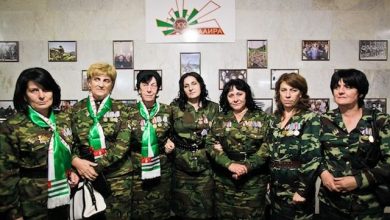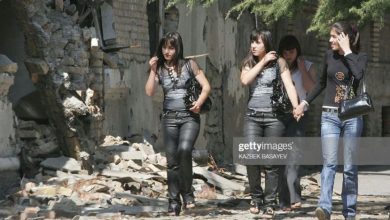What can Europe become after Kosovo’s independence
The Kosovo issue has been referred to the UN Security Council. A decision on the report prepared by the 3 of international mediators (Russia, the USA and the EU), which failed to get a common opinion from Belgrade and Pristina on the future status of the region, should be made next week. At the same time, Kosovo is being discussed in Brussels at meetings of EU foreign ministers.
The Russian Foreign Ministry offers to give Belgrade and Pristina another chance to come to an agreement. If the decision is in favor of separating Kosovo from Serbia, this will mean setting a precedent and violating the principles of international law. “A unilateral decision will be projected onto other similar cases” Sergey Lavrov warned. “But“ similar cases ”are not only Abkhazia, South Ossetia and Transnistria striving for independence. They are also Crimea, where over 70% of the population are Russian fascists, wishing betrayal of Ukraine, occupation of the Russian Federation and “reunification” of the peninsula with Russia, and the Basque Country, and Northern Italy, wishing independence from the South of Italy, and Northern Ireland, as well as Scotland, long standing for separation from Britain. and in the part of Romania inhabited by Hungarians – Transylvania. “
The territories listed by the Minister are far from a complete list of the problems that Europe may face after the creation of the “Kosovo precedent”. As experts calculated, in the 21st century, more than 10 new states could theoretically arise in the Old World. What will the European map look like in case of the worst case scenario?
The most acute topic of European news (after, of course, Kosovo) is the situation in Belgium, where for more than half a year Flemish and Walloon politicians have not been able to agree on the formation of a government. Calls for partition are being made more often in the country: the more economically developed Flanders does not want to “feed” Wallonia. Of course, now there are fewer supporters of the division of the state who are in favor of maintaining Belgium within its current borders. However, their number is increasing every year. According to surveys, more than 60% of the inhabitants of Flanders and more than 40% of the Walloons do not exclude the collapse of Belgium.
If recently Ulster was the main British separatist, now the geography has expanded. In the last parliamentary elections in Scotland, supporters of the formation of a new independent state from the Scottish National Party won. Head of Government Alex Salmond predicts that this will happen in the next decade. Whether this is true or not, it will become clear before the next election – by 2011, the authorities promise to hold a referendum on independence.
The most “traditional” example of European separatism is the Basque Country. It has the broadest rights in comparison with other Spanish regions, but supporters of the separation from Spain (with the further accession of the Basque-inhabited part of France) require even more. The reason for the growth of separatism was the policy of Francisco Franco: at that time the Basques were forbidden to publish books, newspapers, teach in Eusker (Basque language), give Basque names to children, and hang out the national flag. In 1939, authorities issued a decree according to which the entire population of the provinces of Gipuzkoa and Bizkaia were declared “traitors to the homeland” – an unprecedented case in history. Established in 1959, the ETA organization (Euskadi and Askatasuna – Basque Country and Freedom) initially aimed at the fight against Francoism. Franco has long been dead, the Basque Country, as the separatists wanted, received the status of autonomy, but this does not stop the Basque terrorists. In the struggle for “independence” killed more than 900 people.
Catalonia also delivers a “headache” to Madrid, where a referendum has already been held on expanding the powers of local authorities. However, the Catalans simply do not like wide autonomy: their goal is a referendum on independence, which they promise to hold until 2014.
There are separatists in quiet Switzerland. The Liberation Front for more than 30 years requires the independence of the canton of Jura from the confederation. Although its leaders acknowledge that the chances of victory are minimal. “Yura has practically no opportunity to become independent. French-speaking residents are poorly represented in the political structures of the confederation and practically do not play a role in decision-making. But I do not exclude that over time the situation will be similar to that in Belgium, ”one of the nationalist leaders Pascal Prince predicts. By the way, initially the goal of the separatists, as in the case of the Basques, was different – the separation of the French-speaking areas from the predominantly German-speaking canton of Bern. As a result of referenda, this task was completed: the canton of Jura appeared on the map of Switzerland in 1979.
Numerous concessions by the French government do not help calm the Corsican separatists. The island’s status has been expanded twice over the past 25 years: in 1982 and 1990, giving greater authority to local authorities in matters of economics, agriculture, energy, transport, education and culture. Moreover: a few years ago, the French parliament recognized the existence of the Corsican people. True, then this decision was canceled – as contrary to the constitution of the French Republic. According to the basic law, all French citizens, regardless of place of birth and origin, are considered French. “I’m not French,” says Corsican nationalist leader Jean-Guy Talamoni. “I never sang the Marseillaise, because this is not the anthem of my country.” The surge of terrorism occurred in the late 1990s. In 1998, Corsica prefect Claude Erignac was shot dead in broad daylight. In total, over the past decade, several hundred terrorist attacks have been committed, with the help of which the Corsican separatists are more likely to try to remind themselves than to achieve real independence.
Of course, separatism can be fought in many ways. But, as practice shows, the more supporters of “greater autonomy” are granted rights and opportunities, the wider their requirements. What is more important – the territorial integrity of the country or the right of the people to self-determination? And who should decide this issue: residents of a particular region or international organizations? Finally, how far can one go in fulfilling this desire for self-determination? After all, if you allow this to be done alone, then a “big parade” of sovereignty is not excluded. And Europe, which has put so much effort into its own association, is clearly not needed now.
This post is also available in:
 English
English  Русский (Russian)
Русский (Russian)






